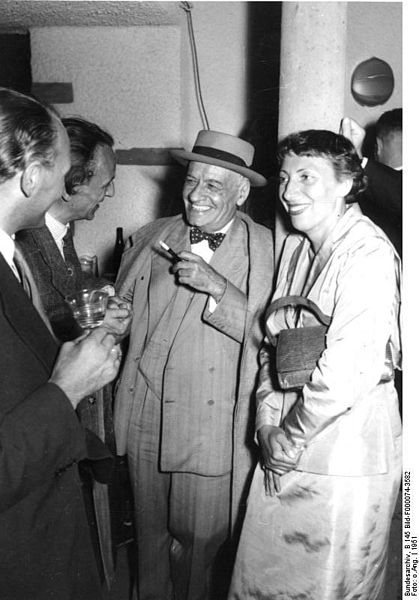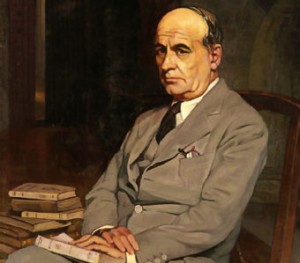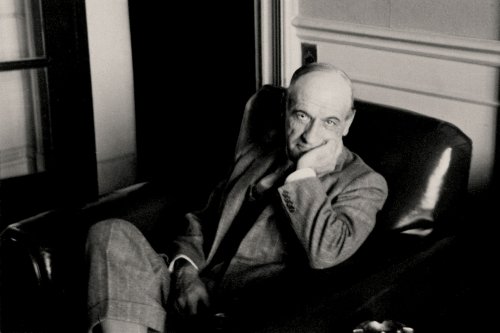<Back to Index>
- Philosopher José Ortega y Gasset, 1883
PAGE SPONSOR
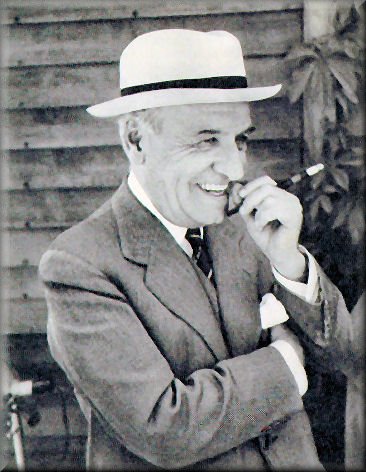
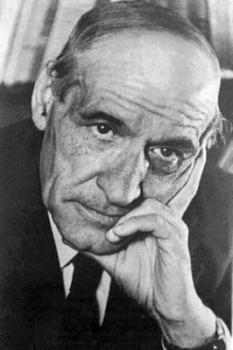
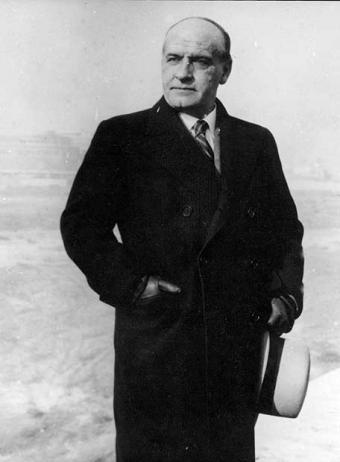
José Ortega y Gasset (9 May 1883 – 18 October 1955) was a Spanish liberal philosopher and essayist working during the first half of the 20th century while Spain oscillated between monarchy, republicanism and dictatorship. He was, along with Nietzsche, a proponent of the idea of perspectivism.
José Ortega y Gasset was born 9 May 1883 in Madrid. His father was director of the newspaper El Imparcial, which belonged to the family of his mother, Dolores Gasset. The family was definitively of Spain's end - of - the - century liberal and educated bourgeoisie. The liberal tradition and journalistic engagement of his family had a profound influence in Ortega y Gasset's activism in politics.
Ortega was first schooled by the Jesuit priests of San Estanislao in Miraflores del Palo, Málaga (1891 – 1897). He attended the University of Deusto, Bilbao (1897 – 98) and the Faculty of Philosophy and Letters at the Central University of Madrid, (now Complutense University of Madrid) (1898 – 1904), receiving a doctorate in Philosophy. From 1905 to 1907, he continued his studies in Germany at Leipzig, Nuremberg, Cologne, Berlin and, above all Marburg. At Marburg, he was influenced by the neo - Kantianism of Hermann Cohen and Paul Natorp, among others.
On his return to Spain in 1908, he was appointed professor of Psychology, Logic and Ethics at the Escuela Superior del Magisterio de Madrid and in October 1910 he was named full professor of Metaphysics at Complutense University of Madrid, a vacant seat previously held by Nicolás Salmerón.
In 1917 he became a contributor to the newspaper El Sol, where he published as a series of essays his two principal works: España invertebrada (Invertebrate Spain) and La rebelión de las masas (The Revolt of the Masses). The latter made him internationally famous.
He founded the Revista de Occidente in 1923, remaining its director until 1936. This publication promoted translation of (and commentary upon) the most important figures and tendencies in philosophy, including Oswald Spengler, Johan Huizinga, Edmund Husserl, Georg Simmel, Jakob von Uexküll, Heinz Heimsoeth, Franz Brentano, Hans Driesch, Ernst Müller, Alexander Pfänder, and Bertrand Russell.
Ortega led the Republican intellectual opposition under the dictatorship of Primo de Rivera (1923 – 1930), and he played a role in the overthrow of King Alfonso XIII in 1931. Elected deputy for the province of León in the constituent assembly of the second Spanish Republic, he was the leader of a parliamentary group of intellectuals known as La Agrupación al servicio de la república ("At the service of the Republic"), but he soon abandoned politics, disappointed.
Leaving Spain at the outbreak of the Civil War, he spent years of exile in Buenos Aires, Argentina, until moving back to Europe in 1942. He settled in Portugal by mid 1945 and slowly began to make short visits to Spain. In 1948 he returned to Madrid, where he founded the Institute of Humanities, at which he lectured.
For Ortega y Gasset, philosophy has a critical duty to lay siege to beliefs in order to promote new ideas and to explain reality. In order to accomplish such tasks the philosopher must, as Husserl proposed, leave behind prejudices and previously existing beliefs and investigate the essential reality of the universe. Ortega y Gasset proposes that philosophy must overcome the limitations of both idealism (in which reality is centered around the ego) and ancient - medieval realism (in which reality is located outside the subject) in order to focus on the only truthful reality (i.e., "my life" — the life of each individual). He suggests that there is no me without things and things are nothing without me: "I" (human being) can not be detached from "my circumstance" (world). This led Ortega y Gasset to pronounce his famous maxim "Yo soy yo y mi circunstancia" ("I am I and my circumstance") (Meditaciones del Quijote, 1914) which he always situated at the core of his philosophy.
For Ortega y Gasset, as for Husserl, the Cartesian 'cogito ergo sum' is insufficient to explain reality. Therefore the Spanish philosopher proposes a system wherein the basic or "radical" reality is "my life" (the first yo) which consists of "I" (the second yo) and "my circumstance" (mi circunstancia). This circunstancia is oppressive; therefore, there is a continual dialectical interaction between the person and his or her circumstances and, as a result, life is a drama that exists between necessity and freedom.
In this sense Ortega y Gasset wrote that life is at the same time fate and freedom, and that freedom “is being free inside of a given fate. Fate gives us an inexorable repertory of determinate possibilities, that is, it gives us different destinies. We accept fate and within it we choose one destiny.” In this tied down fate we must therefore be active, decide and create a “project of life” — thus not be like those who live a conventional life of customs and given structures who prefer an unconcerned and imperturbable life because they are afraid of the duty of choosing a project.
With a philosophical system that centered around life, Ortega y Gasset also stepped out of Descartes' cogito ergo sum and asserted "I live therefore I think". This stood at the root of his Kantian inspired perspectivism, which he developed by adding a non-relativistic character in which absolute truth does exist and would be obtained by the sum of all perspectives of all lives, since for each human being life takes a concrete form and life itself is a true radical reality from which any philosophical system must derive. In this sense, Ortega coined the terms "razón vital" ("vital reason" or "reason with life as its foundation") to refer to a new type of reason that constantly defends the life from which it has surged and "raciovitalismo", a theory that based knowledge in the radical reality of life, one of whose essential components is reason itself. This system of thought, which he introduces in History as System, escaped from Nietzsche's vitalism in which life responded to impulses; for Ortega, reason is crucial to create and develop the above mentioned project of life.
For
Ortega y Gasset, vital reason is also “historical reason”, for
individuals and societies are not detached from their past. In order to
understand a reality we must understand, as Dilthey pointed out, its history. In Ortega’s words, humans have “no nature, but history” and reason should not focus on what is (static) but what becomes (dynamic).
Ortega y Gasset's influence was considerable, not only because many sympathized with his philosophical writings, but also because those writings did not require that the reader be well versed in technical philosophy.
Among those strongly influenced by Ortega y Gasset were Luis Buñuel, Manuel García Morente, Joaquín Xirau, Xavier Zubiri, Ignacio Ellacuría, Emilio Komar, José Gaos, Luis Recaséns Siches, Manuel Granell, Francisco Ayala, María Zambrano, Agustín Basave, Máximo Etchecopar, Pedro Laín Entralgo, José Luis López - Aranguren, Julián Marías, John Lukacs, Pierre Bourdieu, and Paulino Garagorri.
Ortega y Gasset influenced existentialism and the work of Martin Heidegger.
German grape breeder Hans Breider named the grape variety Ortega in his honor.
There have been two translations of La rebellion de las massas (The Revolt of the Masses) into English. The first, in 1932, is by a translator who did not provide his / her name. The first translator is generally accepted to be J.R. Carey. The second translation was published by the University of Notre Dame Press in 1985 in association with W.W. Norton & Co. This translation was carried out by Anthony Kerrigan (translator) and Kenneth Moore (editor), with an introduction by Saul Bellow.
Mildred Adams is the translator of the main body of Ortega's work, including Invertebrate Spain, Man and Crisis, What is Philosophy, Some Lessons in Metaphysics, The Idea of Principle in Leibniz and the Evolution of Deductive Theory, and An Interpretation of Universal History.
Ortega y Gasset had considerable influence on writers of the Generation of '27, a group of poets that arose in Spanish literature in 1920s.
